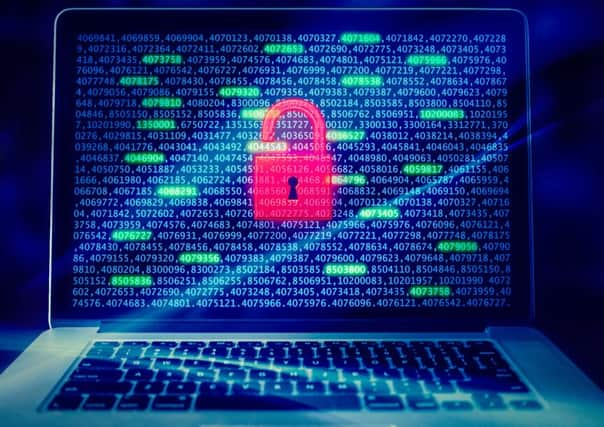MP tells of work on Snooper's Charter


The government argues the provisions included in the new law – called a Snooper’s Charter by critics – will mean security services and police can do their job.
Fareham MP Suella Fernandes, one of the MPs who scrutinised the bill, agrees.
Advertisement
Hide AdAdvertisement
Hide AdWhen the law is enacted, it will order internet service providers, such as Virgin Media and BT, to store customers’ online activity.


The firms will store information on what website a browser visits – but not individual pages – and when and how long someone is connected to the website.
They must keep this data – called information connection records – for a year, with police and intelligence services, such as MI6 and MI5, able to search the database.
Bulk collection of data in a specified area can also be collected.
Advertisement
Hide AdAdvertisement
Hide AdMiss Fernandes, a barrister, said: ‘The bill is vital because we live in a digital age. The internet provides tremendous opportunities to prosper and interact with others and advancements in technology has had a profound effect on society and the way we live our everyday lives.


‘But the digital age also presents us with challenges. The very same benefits that we enjoy are exploited by organised criminals, paedophiles, online fraudsters and terrorists.
‘Our intelligence and security agencies depend upon the acquisition and use of bulk data – information acquired in large volumes and used subject to special restrictions – to acquire vital and unique intelligence that they cannot obtain by any other means. They need the power to intercept messages and they will not be able to do their job without contextual intelligence, provided today in the form of internet connection records.
‘We face rapidly changing, multi-dimensional threats at home, overseas and online.
‘The internet has transformed modern terrorism.
Advertisement
Hide AdAdvertisement
Hide Ad‘Groups like Isis deploy instant messaging, WhatsApp, email and text to avoid detection.
‘Meanwhile, paedophile rings use secret Facebook groups to share indecent photos. Privacy settings and encryption, whilst essential for the law-abiding citizen, are abused to conceal heinous crimes and the most odious criminals.’
Experts from the University of Portsmouth told The News intelligence services have a ‘fairly impossible’ job to do – but that anyone with criminal intent could be using sophisticated ways of avoiding these tactics.
Dr Gareth Owenson, senior lecturer in cyber security and digital forensics, said: ‘There are real risks in collection of people’s data with ISPs storing it.
Advertisement
Hide AdAdvertisement
Hide Ad‘From the legal angle there’s a gap between intelligence services who want the data and those who hold the data, and there’s a legal process in place.’
He said services need the tools to fight crime, adding: ‘We’re asking intelligence services and people to do a fairly impossible task to stop terrorism, which is increasingly homegrown.
‘They need the tools to do that.’
And he welcomed the bill, saying: ‘It’s a move in the right direction, instead of being doing in secret we now know what’s being done and what safeguards are in place. There’s clearly a need for them to do this but it’s important to have the safeguards in place to do this.’
Police will only be able to access the information on websites visited if there is a ‘specific investigation’ and it is ‘necessary and proportionate’.
Advertisement
Hide AdAdvertisement
Hide AdForces will be able to hack into people’s devices if there is a ‘threat to life’ situation – a power previously only available for intelligence services.
Dr Nick Savage, from the University of Portsmouth, said people intent on committing criminal acts could already be using systems to avoid detection.
That includes Tor, which masks an internet user’s activity online.
Dr Savage said: ‘This is data we want to collect and do various things with that data in order to target and give useful, better, intelligence.’
Advertisement
Hide AdAdvertisement
Hide AdOpposition to the bill has largely come from internet providers and phone firms, including Apple, who fear they will be forced to install back doors into their devices.
Labour agreed to abstain in voting in the House of Commons.
During a debate in March, Havant MP Alan Mak asked then shadow home secretary Andy Burnham if he would vote for it. ‘I’m in broad agreement with the government’s objectives,’ Mr Burnham said. ‘I am not seeking to play politics with the Bill or to drag it down.’
He earlier said: ‘Outright opposition, which some are proposing tonight, risks sinking the Bill and leaving the interim laws in place. To go along with that would be to abdicate our responsibility to the police, security services and, most importantly, the public.’
Until last Friday the legislation had been in ‘ping pong’ between the Commons and the House of Lords, as peers wanted to add a section connected to press regulation. That was rejected by government.
Advertisement
Hide AdAdvertisement
Hide AdMiss Fernandes, Mr Mak, Portsmouth South MP Flick Drummond, Portsmouth North MP Penny Mordaunt, Gosport MP Caroline Dinenage and Meon Valley MP George Hollingberry all voted for the bill on November 1.
MP’S ROLE
Suella Fernandes has played a role in scrutinising the bill.
The Fareham MP, a Conservative, was on the bill committee and was in the House of Commons for its passing.
Miss Fernandes said: ‘A big part of being an MP is as legislator – working on and amending laws.
Advertisement
Hide AdAdvertisement
Hide Ad‘I have had the pleasure to sit on the Draft Investigatory Powers Bill Joint Committee and scrutinise the Investigatory Powers Bill during its passage through Parliament.’
The MP added: ‘The Bill has been subject to extensive scrutiny.
‘My work on Bill Committees involved considering 1,500 pages of evidence, interviewing numerous experts and making 86 recommendations to the government.
‘Following that, MPs from all parties have worked together in Parliament meaning the Bill has benefited from the expertise and constructive criticism of many MPs.
Advertisement
Hide AdAdvertisement
Hide Ad‘Critics argue that the Bill erodes privacy and is disproportionate.
‘They say it goes too far and the powers avowed are unnecessary.
‘But this is to misunderstand the nature and challenges of modern security and law enforcement.
‘Without access to communications data, the National Crime Agency would not have had the evidence to prosecute paedophiles who had been visiting websites with indecent images of children.
Advertisement
Hide AdAdvertisement
Hide Ad‘Without interception intelligence, MI6 could not have detected and disrupted numerous plots to attack the UK being planned by individuals based abroad.
‘And without access to bulk data, GCHQ would not be able to uncover cyber-attacks against the UK.’
MAIN PROVISIONS
n Forcing internet service providers and phone companies to store records of websites visited for a year.
n Allowing security services and police to intercept and track electronic communications and mount IT attacks under a warrant authorised by the Home Secretary and a judge.
n Give services access to bulk data.
SAFEGUARDS
Advertisement
Hide AdAdvertisement
Hide Adn Warrants must be obtained if the UK wants foreign agencies to intercept communications here.
n A limit on the time downloaded personal information can be examined.
n Police and security services have to get a senior judge’s permission to access data that would identify a journalist’s source.
n Investigatory Powers Commissioner and judicial commissioners, who will be appointed by the prime minister, brought in by Home Office. They will make public reports